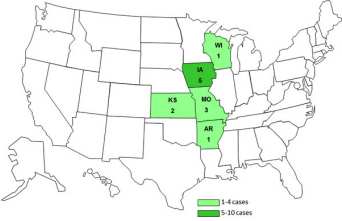The Center for Disease Control (CDC) has reported a multi-state outbreak of shiga-toxin producing E. coli 026 (STEC) infections linked to raw clover sprouts at Jimmy John’s restaurants.
Food Poisoning Bulletin has told you before about the hazards implicit in raw sprouts. Recently, there were seven recalls involving raw sprouts in one month, from December 2011 to January 2012. Many recent outbreaks of foodborne illness have been linked to sprouts.
Sprouts can be contaminated many ways: from irrigation with contaminated water, feces from animals, runoff from farms, improperly cleaned growing or processing equipment, or improper handling. The seeds can be contaminated from the inside out.
Last year, the restaurant management stated they were going to serve clover sprouts instead of alfalfa sprouts because they were easier to clean. But all sprouts carry the risk of bacteria contamination. In fact, the government recommends that anyone in a high-risk group; the elderly, children, pregnant women, or anyone with a compromised immune system, completely avoid sprouts.
So far, 12 people have been infected with the outbreak strain of STEC 026. The case distribution is:
- Iowa (5)
- Missouri (3)
- Kansas (2)
- Arkansas (1)
- Wisconsin (1)
Two people have been hospitalized, but no deaths have occurred as of February 15, 2012. Epidemiologic and traceback investigations have led to raw clover sprouts at Jimmy John’s restaurants. Of the 11 ill persons who gave information, 91% ate at a Jimmy John’s sandwich restaurant in the week before they became ill, and 80% ate a sandwich containing sprouts.

Illness onset ranges from 9 to 49 years, with a median age of 25. All of the ill persons are female. No patients have developed hemolytic uremic syndrome as of February 15, 2012.
The CDC says that “preliminary results of the epidemiologic and traceback investigations indicate eating raw closer sprouts at Jimmy John’s restaurants is the likely cause of this outbreak.”
Traceback identified two sprouting facilities that used the same lot of seed to grow the clover sprouts used at the restaurants. On February 10, 2012, the seed supplier told the facilities they should stop using that particular lot. Other locations may have used the same seeds to grow sprouts and then sell them.
Pulsed-field gel electrophoresis (PFGE) is being used to identify the DNA of the bacteria involved. There are two types of serogroups of STEC bacteria: 0157 or 026. The strain involved in this outbreak has rarely been seen before in PulseNet.




